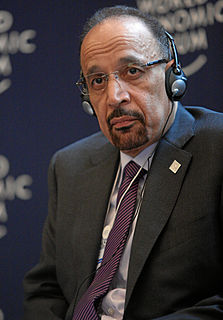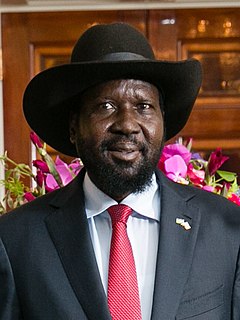A Quote by Khalid A. Al-Falih
If oil prices will go too high, it will slow down the world economy and would trigger a global recession.
Related Quotes
The bottom line for Canada is that Kyoto will precipitate a recession that will cause a permanent reduction in employment, income and the size of our economy. And if global warming is going to happen Kyoto will do nothing whatsoever to prevent it or even slow it down. Why are we still considering it?
Oil is a tangible commodity, so there is a global market. The fact that we may need less may affect the global price because we're big consumers: we probably take about a quarter of global demand. But if suddenly, let's just use a crazy example, fighting in the Middle East led to the closure of the Strait of Hormuz and no oil could get out through the Strait of Hormuz, well that would affect China, India, Europe, it will affect the whole global economy. It will affect us, too, then.
Even if we were to sign peace today, the economic conditions in our country would not improve automatically because it will take some time to reach the level of oil production before the war and the oil prices are likely to remain low for some time as the supply of oil in the world is high and demand is low.
High prices can be the result of speculation, and maybe plunging prices can be attributed to the end of speculation, but low prices over time aren't caused by speculation. That's oversupply, mainly by Saudi Arabia flooding the market with low-priced oil to discourage rival oil producers, whether it's Russian oil or American fracking.
Embracing a low carbon economy will be as momentous as the previous industrial revolutions. As the shift from coal to oil did. And the shift from gas light to electric light. It has the potential to give us the competitive edge in the new global economy. The scale of the challenge is extraordinary. We will need to reinvent in the way we live our lives, the way our world works



































